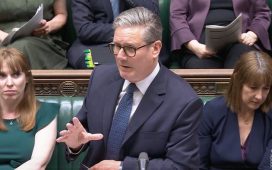The UK energy regulator Ofgem is to investigate suppliers forcibly switching vulnerable customers to prepayment meters.
Jonathan Brearley, chief executive of Ofgem, said on Monday that the regulator did not have legal powers to completely ban forced installations of prepayment meters but it would examine companies’ “checks and balances” and act against those who “do not take due care”.
Most customers pay for their power after use but energy providers can force people on to more expensive prepaid meters when they fall behind with regular payments.
The number of people who have been moved on to prepayment tariffs has risen sharply as they grapple with soaring energy bills and the cost of living crisis.
Brearley’s comments came after Grant Shapps, the business secretary, told suppliers over the weekend that they should voluntarily end the practice of switching households to prepayment meters or face being “named and shamed”. Companies should be offering credit or debt advice, with pre-pay installations a last resort, he said.
Speaking at an event held by the Institute for Government think-tank, Brearley also called for a “serious assessment” of a cheaper social tariff for low-income households, which would mean those that were least able to pay were charged a lower price for their power.
Current rules require suppliers to explore the financial help on offer or carry out appropriate assessments before they can forcibly install prepayment meters or remotely switch a household’s smart meter to a pre-pay tariff.
But Brearley said some people were being moved “without even knowing about it”. He cited an example of a customer in Glasgow who “left to go on holiday and returned to find he’d been switched to pre-pay without his knowledge and had no way to top up”.
“Although there is good practice in many places, no company came through [in initial investigations] without needing to improve and all have been required to submit plans to meet the standards we set,” Brearley said.
The government has introduced an energy price guarantee scheme aimed at restricting a typical household bill to about £2,500 a year until the end of March, and to about £3,000 until spring 2024.
Although wholesale gas prices have been falling, Brearley said it was unlikely that prices would return to pre-pandemic levels and that new approaches were needed in Britain’s energy sector.
Energy UK, which represents the industry, said: “Suppliers are already required to have exhausted all other options before installing a prepayment meter by warrant.”
The comments came as National Grid confirmed on Monday that it was planning to pay some households that use smart meters to use less power today and tomorrow in what will be the first time it has used a new scheme designed to help prevent power shortages.
More than a million households and business are signed up to the Demand Flexibility Service, which rewards people, usually via money off their bills, for turning off appliances such as ovens and dishwashers during a specific period when electricity demand is high.
The service is expected to run from 5pm to 6pm on Monday and between 4.30pm and 6pm on Tuesday. National Grid ESO said its announcement should not be interpreted as a sign that electricity supplies are at risk.
A separate measure, calling on coal-fired power plants to fire up as back up power has been stood down for Monday evening, although one of them is on standby for Tuesday.











